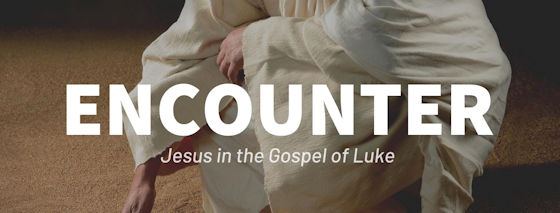If we’re walking Jesus’ path we’ll encounter Jesus’ people.
There Are No Shortcuts
In Luke 4:14-30, we read of Jesus’ return to his home in Nazareth and the message he delivered to those in his home synagogue.
It does not go well.

Trust me; I know what it’s like to preach a bad sermon. I even know what it’s like to preach a bad sermon at my home church! But I’ve never preached a sermon so bad that the whole congregation took me to the edge of town to throw me off a cliff!
Of course, it does help that we don’t have any cliffs nearby.
The final verse of the story is somewhat cryptic. With his entire hometown attempting to toss him off the brink, Jesus simply walks away. Luke gives no indication that the escape was miraculous or mystical. He simply writes, “But passing through their midst, he went away” (Luke 4:30). It’s as though Jesus escapes by taking a different path.
Since You Are the Son of God . . .
If you listen closely, there’s an echo from the story at the beginning of this chapter. In the verses that immediately precede this story, the devil tempts Jesus in the wilderness. In his third temptation, we read:
And he took him to Jerusalem and set him on the pinnacle of the temple and said to him, “If you are the Son of God, throw yourself down from here, for it is written,
Luke 4:9-11
“‘He will command his angels concerning you,
to guard you,’
and
“‘On their hands they will bear you up,
lest you strike your foot against a stone.’”
“Throw yourself down from this great height. Your Father will save you, and everyone will know exactly who you are.” It wasn’t merely a temptation to display his identity; it was a call to be the Christ without the cross; to receive the worship without the sacrifice. It was a shortcut.
Take the Long Way Home
I don’t know that we can comprehend what Jesus went through. Alone in the wilderness for forty days, standing firm against the devil’s temptation. Then, to be at home among the people who know you best and finding yourself confronted by the same temptation. If they threw him off the cliff, would the Father save him? Would they worship him? Would he need to go to the cross?
“But passing through their midst, he went away.”
I’m left wondering if what happened at Nazareth was as much of a test as what the devil put him through in the wilderness. It might have even been more of a test. It was a test to take an easier path — one with the least resistance. A road with no cross at the end. A road where he didn’t have to touch lepers, heal the blind, or forgive sins.
But that’s not the path he had chosen for himself or for us.
Walking Jesus’ Path
In my own reading of Jesus’ rejection in Nazareth, I suspect Jesus — having grown up in the town — probably knew a shortcut away from the cliff. I imagine him taking a path he had walked as a child and getting away from the crowd. The rest of Luke’s Gospel is the story of Jesus’ long walk to Jerusalem and the cross. There are no shortcuts. Only encounters along the way; encounters with the poor, the captives, the blind, and the oppressed (Luke 4:18).
At the end of chapter 4, Jesus declares, “I must preach the good news of the kingdom of God to the other towns as well; for I was sent for this purpose” (verse 43). He encounters others, he engages them, and the gospel spreads
If we’re walking Jesus’ path, we’ll encounter Jesus’ people. The question is, will we engage them, or will we simply pass through their midst?
Will we find that Jesus has passed through our midst as well?




